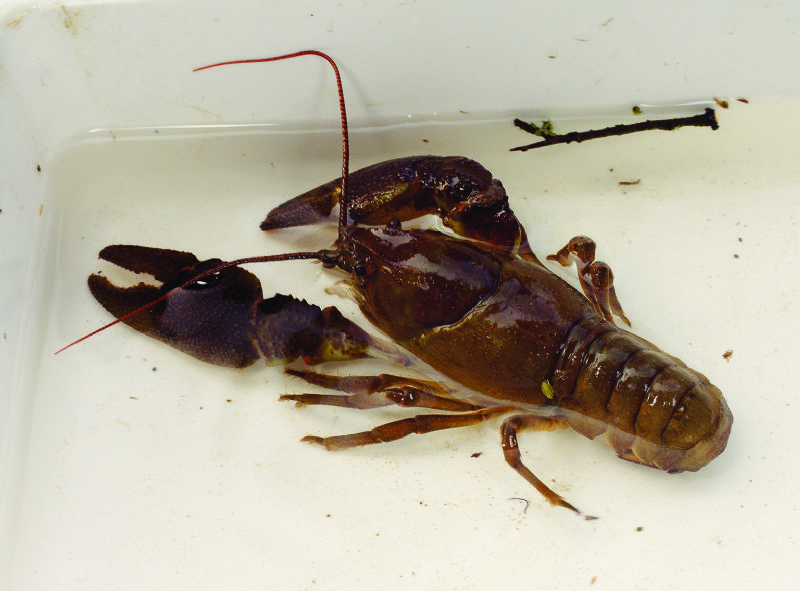- Home
- News, Articles & Reviews
We are hiring! Please click here to join our growing magazine delivery team in Gloucestershire!
Areas
Pets & Wildlife
Archive

Protecting native species
All Areas > Pets & Wildlife > Wildlife Matters
Author: Dorothy Glen, Posted: Friday, 24th March 2023, 09:00
Back in January, I wrote a lighthearted piece about grey squirrels. This month, I want to look at the more serious impact of invasive species and what hope there may be for our declining native species.
Two significant examples of harmful invasive species in the UK are grey squirrels and signal crayfish. You’ll remember that grey squirrels dominate habitat and food shared with red squirrels, and carry disease that is fatal to the reds. As a result, red squirrels could be under threat of extinction from England in around 10 years.
A battle beneath the surface
Similarly, but less visibly, a battle is happening beneath the surface of our waterways. The American signal crayfish was introduced to the UK in the 1970s for food, but quickly became established in the wild where it completely dominates our only native freshwater crayfish – the white-clawed crayfish.
Signal crayfish are efficient breeders and voracious feeders, out-competing the native species every time. They also carry a fungal disease known as ‘crayfish plague’, which is fatal to the white-clawed crayfish. White-clawed crayfish are now listed as endangered on the global IUCN Red List of Threatened Species.
Unlike the native species, grey squirrels and signal crayfish also both cause tremendous damage to their habitats. Grey squirrels strip the bark of our native woodland trees, impacting their health as a result. Their preferred trees are some of our most biodiverse, meaning damage also impacts the woodland ecosystem, including, for example, the 2000+ species that can rely on any one mature oak tree.
Destructive burrowing
Also destructive, signal crayfish burrow into the banks of rivers and are dramatically changing the river environment. Extensive burrowing can result in bank failure, for example at the Priors Park landscape gardens in Bath where they have caused millions of pounds’ worth of damage. They also deposit large amounts of clay into the water, which clogs riverbeds and affects fish breeding.
White-clawed crayfish can still be found in pockets of Gloucestershire, notably in the Forest of Dean. However, populations in the forest were hit severely in 2021 by an outbreak of crayfish plague, when many hundreds were found dead. Being a fungal disease, crayfish plague is easily spread, as spores can be picked up and moved by any person or animal that travels through it.
It’s not all bad news though – there have been initiatives to translocate the vulnerable species to ‘ark’ locations. In 2018, Gloucestershire Wildlife Trust received funding for such a project, and successfully moved a population to a safe site in the Stroud Valley.
Oral contraceptive trials
There is hope, too, for the red squirrel. The UK Squirrel Accord, with Defra, is trialling an oral contraceptive that leaves grey squirrels unable to reproduce. Carefully developed feeding boxes allow grey squirrels inside to reach a hazelnut paste containing the contraceptive.
The trials are going well and could lead to an efficient, non-violent solution to control the grey squirrel population. Hopefully, this will see the return of our native red squirrels to their lost habitats – habitats which are also improving due to the forestry industry planting more native broadleaf species, to meet government targets of increased woodland cover.
With thanks to Marcus Stroud for his input.Other Images
Copyright © 2025 The Local Answer Limited.
Unauthorized use and/or duplication of this material without express and written permission from this site's author and/or owner is strictly prohibited. Excerpts and links may be used, provided that full and clear credit is given to The Local Answer Limited and thelocalanswer.co.uk with appropriate and specific direction to the original content.More articles you may be interested in...


© 2025 The Local Answer Limited - Registered in England and Wales - Company No. 06929408
Unit H, Churchill Industrial Estate, Churchill Road, Leckhampton, Cheltenham, GL53 7EG - VAT Registration No. 975613000You are leaving the TLA website...
You are now leaving the TLA website and are going to a website that is not operated by us. The Local Answer are not responsible for the content or availability of linked sites, and cannot accept liability if the linked site has been compromised and contains unsuitable images or other content. If you wish to proceed, please click the "Continue" button below:




